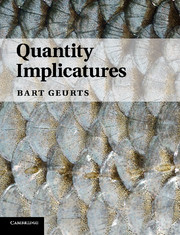Book contents
- Frontmatter
- Contents
- Preface
- Introduction
- 1 Gricean pragmatics
- 2 The Standard Recipe for Q-implicatures
- 3 Scalar implicatures
- 4 Psychological plausibility
- 5 Nonce inferences or defaults?
- 6 Intentions, alternatives, and free choice
- 7 Embedded implicatures: the problems
- 8 Embedded implicatures: a Gricean approach
- Afterword
- Notation and abbreviations
- References
- Index
Afterword
Published online by Cambridge University Press: 04 February 2011
- Frontmatter
- Contents
- Preface
- Introduction
- 1 Gricean pragmatics
- 2 The Standard Recipe for Q-implicatures
- 3 Scalar implicatures
- 4 Psychological plausibility
- 5 Nonce inferences or defaults?
- 6 Intentions, alternatives, and free choice
- 7 Embedded implicatures: the problems
- 8 Embedded implicatures: a Gricean approach
- Afterword
- Notation and abbreviations
- References
- Index
Summary
Looking back on the preceding chapters, we can discern a number of major themes: some critical, others more constructive. The critical themes all relate to Grice's distinction between conventional and non-conventional aspects of linguistic and paralinguistic content. The seminal idea underlying the Gricean programme for pragmatics is that conventional content is to be strictly separated from conversational implicature, and one of the recurrent trends in the literature is for interpretive phenomena that admit of a perfectly decent pragmatic explanation to be nonetheless relegated to the domain of linguistic convention. This trend manifests itself variously, but I suspect it is always rooted in the same basic intuition, namely, that certain aspects of interpretation just don't feel like bona fide Gricean inferences of the “petrol station” variety.
To use the hackneyed example one last time, there appears to be a widely spread gut feeling that “some” has an upper-bounded meaning which is too robust to be left to Gricean pragmatics. I have tried to dispel this intuition in sundry ways: by clarifying the notion of cancellability; by arguing that Q-implicatures are not defaults; by trying to show that the robustness of some Qimplicatures admits of a pragmatic explanation and that so-called “embedded” Q-implicatures can be accommodated by the Gricean theory. I have even tried to explain what underlies the conventionalist intuition. But the long and short of it is that there is simply no need for a conventionalist analysis of (some) Q-implicatures, because the Gricean account will do just fine, and better than any of the non-pragmatic alternatives we have mustered.
- Type
- Chapter
- Information
- Quantity Implicatures , pp. 193 - 196Publisher: Cambridge University PressPrint publication year: 2010



